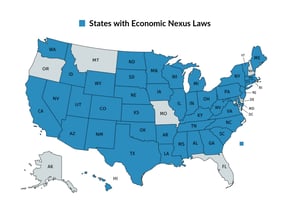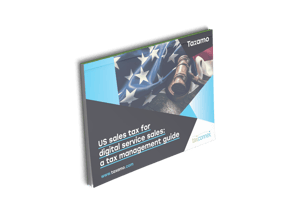Sales Tax Scaries 4: Nexus and Taxability
When Sales Tax Creeps Up on You
Ever notice how the first characters in every horror movie never...

If you don’t live in the United States (or even if you do), the laws surrounding US Sales Tax can be quite confusing. In fact, the United States has possibly the world’s most complex sales tax regime. This is because each state sets its own sales tax rules, and states often take widely varying approaches. As a result, every state has a different tax framework, with variations in regulation covering everything from tax liability and tax rates to exemption categories and reporting requirements. On top of this, local area tax jurisdictions also have powers over some aspects of taxation and can set different rules for their area.
Given the wide variety of rules and the rapid rate of change, every business selling into the US faces compliance challenges. If you are a remote seller and lack a physical presence, here are a few items to consider when looking at building your US sales tax approach.

Destination or origin-based sales tax rules?
As a remote seller, you will normally follow destination-based tax rules, meaning you must, in theory, apply the sales tax rules and rates of the customer’s location. But there can be cases where remote sellers are seen to make sales within a state – for example, when goods are held in a warehouse in the state. In this case, origin-based tax rules could apply depending on the state. You must then collect and remit tax according to the rules and rates applicable at the business location.
Origin-based tax rules
Origin-based sourcing applies to intrastate commerce. When a seller ships from within an origin-based state to a destination within the same origin-based state, the sale is sourced to the origination point and sales tax applies at the origination point.
Destination-based/remote seller tax rules
Destination-based sourcing applies to interstate commerce. When a seller ships into any state from a location outside that state, the sale is sourced to the destination point and sales tax applies at the destination point.
Customer location determination
In the United States, tax rates are applied at a ZIP code level. In many cases, this will mean that the 5-digit US zip code is used along with the product taxability code to determine the sales tax rate for a given transaction. For more accurate sales tax rates ‘ZIP + 4’ code can be used. This means that the additional address details are supplied such as a street address, city, state and then address validation is performed to match the supplied address to the United States Post Office address database. This will result in a very precise address identification and so the relevant State and City taxes can be identified.
Tax exemptions and exclusions
Every state can apply tax exclusions on goods and services within their state. This means the good or service is non-taxable for all customers purchasing the item. However, there are further tax-exempt purchases. Tax exemptions can also be applied at the customer level as opposed to the product level.
To prove sales tax exemption, the customer must provide you with a tax exemption certificate.
You must then review the certificate for completeness and validity (and be able to prove that you have applied due diligence in the process). Once you have accepted a certificate, it is not necessary to validate every transaction by the certificate holder as the certificate can be valid from 1 year to several years. However, it is important to implement a system to track the validity of exemption certificates.
Exemption certificates generally fall into two categories:
Use-based exemptions: Resale exemption certificates are the most common form of exemption certificate. As sales tax is charged at the point of final sale, goods and services bought for resale are often exempt to avoid double taxation. Industries where use-based exemptions commonly exist are manufacturing, research & development and teleproduction.
Entity-based exemptions: Some entities that are not resellers of goods may also be exempt from sales tax. These include charities, churches and religious organizations, education organizations, government/political organizations, trade organizations, social welfare organizations and veterans’ organizations.
Multi-jurisdiction exemption certificates
Tax exemption certificates are generally state-specific unless the business has provided you with a multi-jurisdiction certificate covering the relevant states. There is no US-wide exemption certificate; however, the Multi-State Commission has created a uniform sales and use tax certificate which many states accept. This means your systems must be able to handle both single and multi-state certificates.
Planning for sales tax compliance in the US requires strategic consideration. You have to keep up with ever-changing legislation, ongoing maintenance of various systems and vendors, finding correct tax rates, and reporting requirements. This is enough to make even the most seasoned tax professional’s head spin. At TaxConnex, we take it off your plate completely. Contact us to learn how our dedicated sales tax professionals can help your business navigate the US road to compliance.

This is an excerpt from our eBook, US Sales Tax for Digital Service Sales: A Tax Management Guide. To learn more and get information on maintaining sales tax compliance when selling into the US, download the full guide here.

Ever notice how the first characters in every horror movie never...
Copyright © 2025 TaxConnex, LLC